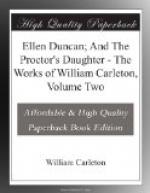“I was weary an’ wake wid fatigue an’ hunger—I couldn’t move a step further than jist to lave the road an’ lie in a dhry ditch, as I thought, to die, jist as I complated the journey to my native place! But this little girl—this goolden-haired child—kem to me, an’ raised my head, an’ poured a sweet draught of milk into my mouth, an’ brought me food, an’ sat by me, an’ talked wid me, till I was at last able to join wid you! An’ afther this—afther this, would you have me harm any one belongin’ to her—even though he is my bitterest inimy?”
The quick changing of purpose—the sudden transitions of the Irish nature—are proverbial; and then those who had been loudest in their murmurs were loudest in their cries of approval; and a deep huzza of exultation at the magnanimity he displayed, told Dillon that he had little to fear from their opposition. So once more embracing the little girl, he gave her hand to her father, and taking the leader’s arm, strode away, exclaiming:
“Whelan, you may thank your child—for ’tis she ha’s saved you!”
The party all followed after him; and in a few moments more there was no trace of the scene of violence that had been partly enacted, and the brook’s low bubblings, as before, alone disturbed the silence of the slumbering night.
We will not attempt to describe poor Nanny’s joy at her son’s making himself known, and informing her of the circumstances that had taken place—enough to say, he had managed to escape before his time was out; but as no one informed against him, he was suffered to remain in peace, and manage a small farm in the next county, where he and his mother soon after retired, as he determined totally to forsake his old mischievous pranks.
We were present at the village, altar, when Minny, who had grown up in beauty and gentleness, gave her hand to a youth—the selected one of her heart—and her gray-headed parent looked meekly on, blessing that Providence who had given him such a child.



